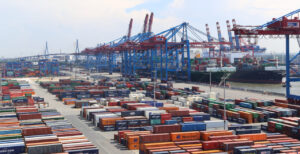The Port of Riga, Latvia, has begun testing 5G solution to protect the environment and foster efficiency.
According to a statement, the Port will conduct trials to determine 5G’s potential to cut waste and increase eco-efficiencies in its operations.
As part of the initiative, it will collaborate with LMT and Lufthansa Systems, the Port of Riga to utilize drone technology equipped with artificial intelligence (AI) and a drone traffic management platform to determine pollution at the port.

5G in ports
5G is currently the latest generation of mobile communications solutions, which will provide a wireless internet experience equivalent to optical internet.
The technology increases mobile internet connectivity by 10 times. It will be able to serve the rapidly growing number of Internet of Things (IoT) applications, making it possible for up to one hundred times more connections to operate simultaneously in one place than was possible with previous mobile communications generations.
5G at the Port of Hamburg
One of the most important 5G projects is taking place in the Port of Hamburg, where a collaboration between Nokia and Deutsche Telecom, is exploring several scenarios in regard to how to use the new capabilities of 5G technology.
At the port, 5G technology regulates traffic light signals in order to ensure continual and safe movement of transport.
The Hamburg project is significant in that the tests are taking place in a real, complex and changing environment, as opposed to under laboratory conditions.
Exclusive Paper – The Port of Hamburg: A 5G Testing Ground
Every day, over 10,000 heavy goods arrive at Germany’s biggest port and about nine million containers pass through the port annually.
Environmental sensors fastened to ships measure the level of carbon dioxide emissions, while other sensors monitor the lighthouse, the technical condition of lighthouses and buoys and information about the need for maintenance.
By 2025, the Port of Hamburg plans to use more than 100,000 mutually connected IoT sensors. This would not be possible using a fixed network.
5G IoT hardware makes it possible to support the operation of tens of thousands of devices, to ensure their battery life for over 10 years and transmit and analyse the resultant data efficiently.









